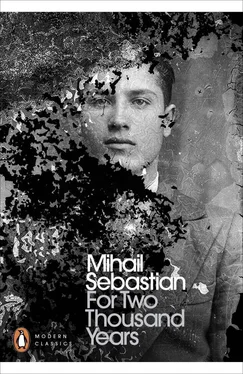Here he is, his assured lordly demeanour, his rough joined eyebrows, his languid but commanding hand, here in this house that is just like him in its clean lines, its total precision, the starkness of its every detail. In a dressing gown, a wool scarf around his neck, his head inclined slightly towards the lamplight shining from the right, there is something monastic in his bearing, and in his frown, now softened a little by a smile smouldering in shadow.
I listen to him with a certain panic. Panic that he might fall silent at any moment and that I will be required to speak. And about what? Good God, what could I possibly say in response? And how would I say it? The pressure of his presence unnerves me more than it gladdens me, though I know it makes me very happy indeed.
Has he perceived something of my panic? He rises and fetches his pipe-tobacco, lights up, then goes to the window and stares out, as if watching for something in the fading evening.
*
I’d rather not see him again. I feel ashamed. Seldom have I been so utterly stupid and dull. My intelligence! A certain youthful attitude of mind, that’s all it amounts to. And when you don’t even have that, nothing is left. How else can my total vacuity yesterday be excused? Two hours of conversation, two hours of me being silent. I participated with ‘yes’ and ‘no’ in a conversation from which I had wanted everything. I don’t know what I mean by ‘everything’, but I must mean a lot by it, because I feel so acutely that I completely wasted my visit to Blidaru’s home.
*
On Monday he spoke at the Foundation, as part of the Social Institute’s series of lectures. There was no risk of me being seen in that immense crowd, in my seat in the second balcony.
What charm and simplicity the man has. His style is terse and angular, rough and digressive. He throws out a word, opens a secret door, kicks a stone he’s picked up along the way. Spontaneously, and somehow trusting all to hazard. And then, when the hour is up, and you look despairingly at the field of thought that has been devastated, suddenly — I couldn’t tell you how — matters begin to resolve themselves. The disconnected ideas strewn about over three-quarters of an hour return home in the final quarter, clear, quiet, necessary, utterly compelling, and completing a cycle of reasoning as though it were a symphonic arrangement.
I will understand later, when I’m older, what kind of a thinker Blidaru is. But I already know he is a great artist.
*
He caught up with me in the lecture hall as I was leaving and took my arm in a simple, friendly fashion.
‘Let’s take a stroll.’
I walked with him as far as his home, and several times along the way tried to talk to him. But it wouldn’t come. His fault this time rather than mine, though, as he wasn’t in a mood for chatting. He just wanted to walk, hands in the pockets of his long raincoat, hat over his eyes and his nose in the air, taking in the smell of rain and wet trees — the smell of the last days of November.
I walked nervously beside him, eager to cut through his small-talk to interject the questions I wanted to ask, the things I didn’t clearly understand but which seemed so compelling. Several times I tried to start a sentence and gave up. Several times I formulated one in my mind but was unable to take it anywhere.
He must have sensed how worked up I was there, to his right, tongue-tied yet bursting to speak, because he suddenly halted in the light of a shop window and looked straight at me, in surprise.
‘What’s wrong with you?’
‘Professor, what I want to say is …’
But I did not continue.
‘I know what you want to say. You want to say it all. Which is the simplest and the most complicated thing in the world. Forget it. What’s the hurry? There’s none, believe me. We wanted to take a walk: so let’s walk. We’ll talk another time, when it occurs. Only those things that “happen” are worthwhile.’
He gave me a cigarette, took my arm and led me onwards, changing the subject.
The university was closed the day before yesterday, 9 December, in anticipation of the 10th. Quiet days, however: the occasional scuffle and an unremarkable street demonstration.
In any case, things have settled down. I’ve re-read, from the green notebook, the page from this day last year.
How young I was! Someday I’ll manage to accept hurt without it affecting my personal calm in the slightest. Perhaps this is the only way to be strong. Anyhow, probably many blows lie in store for me.
I ask myself if fleeing from the dorms and my fellow students, even for this rough sort of life I lead, was in fact an act of courage or one of cowardice.
I ask myself if I have the right, for the sake of my solitude, to laugh at the cheap heroism of Marcel Winder, who still today luxuriates in enumerating the beatings he gets. Though he goes off at the mouth and I restrain myself, the fact remains that he’s the one facing adversity while I turn my back on it. My way might be more elegant, but is it fair?
And don’t forget Liebovici Isodor, still out there on the front line, patient and silent, inexpressive, without illusions or vanity.
A visit to the dorms. Black, black misery. Nothing has changed here. The same stoves, either cold or smoking, the same long rooms with their cracked cement, the same people. A few new faces — first-year boys.
Liova is gone. He died over the summer. He was somehow made for death, that boy, and seems to me to have fulfilled his destiny through tuberculosis in the same way others fulfil theirs by writing a book, building a house or completing their work. I talked to our old dorm-mates from last year about him. Nobody had much to say.
‘He had these yellow boots, nearly new, that he left here when he went away,’ said Ianchelevici Şapsă. ‘But they’re no good: too small.’
Liova, poor boy, your death did not even do that small good.
This building, despite being warmly called a ‘shelter’, is strangely apathetic, horribly icy … And yet several hundred young people live here. And only one room is alive, bustling, and breathing passion: ‘the social issues room’. That’s what they call it, with irony, because Winkler, the old medical student, has his bed here. Winkler has been kept from his exams by Zionism and by S.T. Haim, a mathematics student at the polytechnic and a fiercely argumentative Marxist.
The pair of them quarrel endlessly.
‘I’m going to report you both,’ shouts Ionel Bercovici, despairing of ever getting to the end of a page on constitutional law.
‘Idiot,’ replies S.T.H. (who is referred to by his initials, for some reason), ‘you want us to hold back the march of history until you’ve passed your exam?’
Neither Winkler nor S.T.H. can have a very good opinion of me. They regard me as an outsider. At any event, they felt I was a fence-sitter, someone who observed in passing, neutrally. I listened quietly in a corner to their confused disagreement without intervening, enduring stubbornly the hard, flashing glances they shot at me over their shoulders.
‘Dilettantes, that’s what you are,’ shouts S.T.H., ‘dilettantes in all you do, in all you feel or think you feel. Dilettantes in love, when you think you’re making love, dilettantes in science when you dabble in science, dilettantes in poverty, when you live in poverty. Nothing is seen through to its conclusion. Nothing heroic. Nothing unto the death. Everything for a cautious, compromised life. And you call yourself a Zionist, but you haven’t a clue if there really is a land called Zion. I don’t believe in it, you do. So why don’t you actually go there, set foot on that land? You sit here agitating, which consists in cutting out receipts for membership fees for ten thousand people as smart as you are, and they too reduce a drama to a membership card.’
Читать дальше












